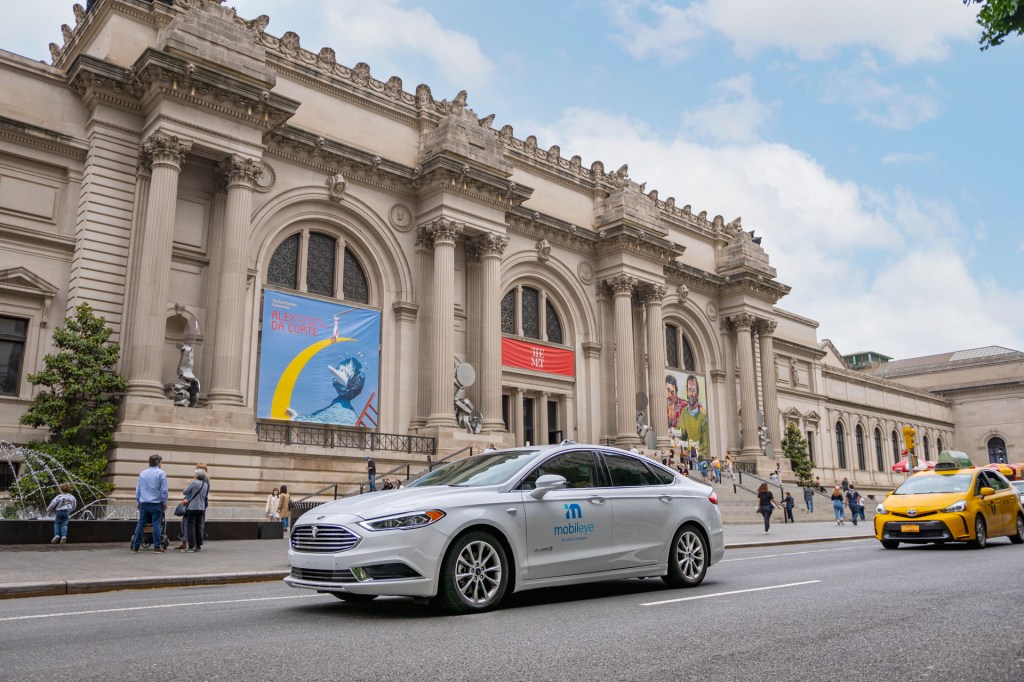Mobileye, a subsidiary of Intel, has expanded its autonomous vehicle testing program to New York City as part of its strategy to develop and deploy the technology.
New York City joins a number of other cities, including Detroit, Paris, Shanghai and Tokyo, where Mobileye has either launched testing or plans to this year. Mobileye launched its first test fleet in Jerusalem in 2018 and added one in Munich in 2020.
“If we want to build something that will scale, we need to be able to drive in challenging places and almost everywhere,” Mobileye president and CEO Amnon Shashua said during a presentation Tuesday that was streamed live. As part of the announcement, Mobileye also released a 40-minute unedited video of one of its test vehicles equipped with a self-driving system navigating New York’s city streets.
These vehicles, which began testing in New York City last month, are driving autonomously (with a safety operator behind the wheel) using only cameras. The vehicles are equipped with eight long-range and four parking cameras powered by its fifth-generation system on chip called EyeQ5.
Mobileye is bringing its autonomous vehicle test fleets to at least four more cities in 2021
That does not mean that Mobileye is taking a camera-only approach to autonomy once it deploys. The company has also developed another subsystem with lidar and radar, but no cameras, that also drives autonomously. The two subsystems of sensors and software will be combined and integrated to provide redundancy in robotaxis. The camera-only subsystem is what Shashua described as at “the cost level for consumers” and one that will be used to evolve driving assist systems. Later this year, Mobilieye’s camera-only system using the EyeQ5 SoC will be launched in a Geely Auto Group vehicle.
New York City has been in Shashua’s sights for more than six months. He first mentioned a desire to test on public roads in New York during the virtual 2021 CES tech trade show in January with the caveat that the company would need to receive regulatory approval. Now, with that regulatory approval in hand, Mobileye is the only company currently permitted to test AVs in the state and city. GM’s self-driving subsidiary Cruise outlined in 2017 a plan to test AVs in New York and even mapped parts of lower Manhattan. The company never scaled up the test program in NYC, deciding instead to focus on its primary target for commercial deployment: San Francisco.
Mobileye applied for a permit through New York State’s autonomous vehicle technology demonstration and testing program. The company met the requirements outlined in the program, which includes compliance with all federal standards and applicable New York State inspection standards as well as a law enforcement interaction plan, according to Mobileye.
“I don’t think there’s anything special about receiving approval, you simply need to go through this process,” said Shashua, who described the process as lengthy and in some ways similar to the stringent requirements to test in Germany. “I think what is special is that it’s very, very difficult to drive here.”
Mobileye is perhaps best known for supplying automakers with computer vision technology that powers advanced driver assistance systems. It’s a business that generated nearly $967 million in sales for the company. Today, 88 million vehicles on the road are using Mobileye’s computer vision technology.
Mobileye has also been developing automated vehicle technology. Its full self-driving stack — which includes redundant sensing subsystems based on camera, radar and lidar technology — is combined with its REM mapping system and a rules-based Responsibility-Sensitive Safety (RSS) driving policy.
Mobileye’s REM mapping system crowdsources data by tapping into consumer and fleet vehicles equipped with its so-called EyeQ4, or fourth-generation system on chip, to build high-definition maps that can be used to support in ADAS and autonomous driving systems. That data is not video or images but compressed text that collects about 10 kilobits per kilometer. Mobileye has agreements with six OEMs, including BMW, Nissan and Volkswagen, to collect that data on vehicles equipped with the EyeQ4 chip, which is used to power the advanced driver assistance system. On fleet vehicles, Mobileye collects data from an after-market product it sells to commercial operators.
Mobileye’s technology is mapping nearly 8 million kilometers day globally, including in New York City.
The strategy, Shashua contends, will allow the company to efficiently launch and operate commercial robotaxi services as well as bring the technology to consumer passenger vehicles by 2025. Shashua explained this dual approach in an interview with TechCrunch in 2020.
“There was realization that dawned on us awhile ago,” he said at the time. “The Holy Grail of this business is passenger car autonomy: where you buy a passenger car and you pay an option price and with a press of button it can take you autonomously to wherever you want to go. The realization is that you can’t reach that Holy Grail if you don’t go through the robotaxi business.”
On Tuesday, Shashua said Mobileye was the only company that has its foot in both camps. (Although it should be noted that Toyota’s Woven Planet does have some strategic overlap.)
“We’re building our technology in a way that supports scale, especially geographic scale, using our crowdsourced mapping technology and building new sensors such that the entire package — the entire system — will be under $5,000 cost to allow consumer AVs, and on the other hand, we have a division building a mobility-as-a-service or robotaxi service,” Shashua said Tuesday. “This is one of the reasons why we purchased Moovit last year, to enable the customer facing of all the layers above the self-driving system to enable mobility-as-a-service business.”
Intel to buy smart urban transit startup Moovit for $1B to boost its autonomous car division






























Comment